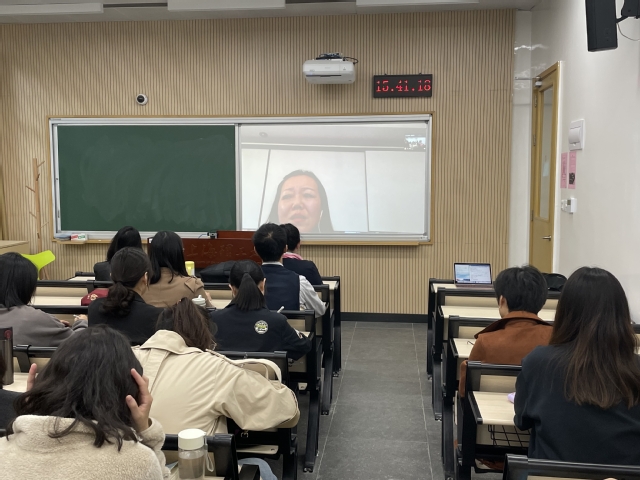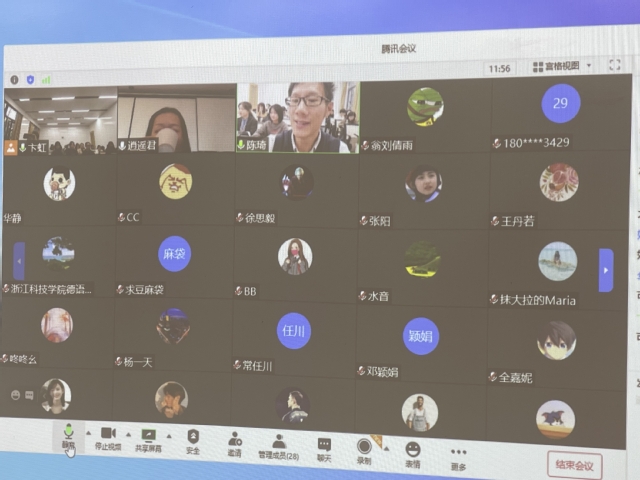Xiao Jun, chief senior interpreter of the German language from the Ministry of Foreign Affairs, PRC delivered a lecture on Foreign Affairs Interpreting Practice at the invitation of Department of German, College of Foreign Languages(CFL),USST from 3 pm to 5 pm on November 10. Deputy Dean Chen Qi of CFL host this meeting. This lecture was available both online and offline.That is to say, a small number of teachers and students came to the room where the lecture was being delivered while others could join in the Tencent Meeting to listen to the lecture and communicate with Mr. Xiao online.
Ms. Xiao introduced teachers and students the skills, strategies and relevant qualities that are needed in the interpreting practice in simple terms by giving vivid examples in a humorous way. At the beginning of the lecture, she asked the audience about their purpose of becoming interpreters and pointed out the importance of interpreting in foreign affairs and the significance of staying true to their original aspiration and mission. Then, she introduced the features of German language interpreting on foreign affairs, laying emphasis on the necessity of preparation and daily knowledge accumulation. Later, she gave some practical examples to remind them to always bear in mind the cultural differences in translation; she also shared some practical skills in interpreting like shorthand skills and the etiquette in interpreting. At last, Ms. Xiao gave her wishes to the students present at the lecture and expressed her hope that they will keep learning and spend more time building up their knowledge off the stage. In the meantime, they should also keep a good mood, and that neither success nor failure is final, for what counts is the inner courage to continue. Whats more, she hoped that students should not only achieve excellent academic credits in their work, but more importantly, be a good person.
In the Q&A section, students present vied with each other to raise questions and further communicated with Ms. Xiao with regard to such things as employment and the choice of translation strategies. At last, Wang Enuo, vice director of MTI Education Center of CFL, USST, added that nowadays the demands contemporary society makes on interpreters are becoming increasingly stricter. Interpreters not only need language ability, but also professional ability and cross-cultural ability, which not only brings about challenges but also opportunities to all engaged in translation and interpreting. In the end, this lecture ended successfully with a round of warm applause.
Ms. Xiao is chief senior interpreter of the German language from the Ministry of Foreign Affairs, PRC and she is in charge of German language training for senior interpreters and new cadres of the Ministry of Foreign Affairs. As an experienced interpreter, she has worked as a consecutive or simultaneous interpreter in several thousand important international and bilateral events, accompanied such state leaders as Chinese President, Premier and Ministers to visit other countries and she has served as chief interpreter of German language for Germanys President, Chancellor and Palarmentprasient of the German Bundestag for many a time. In addition, she has served as the reviewer of all kinds of documents for over twenty years and has taken part in the document translation and document finalization for the National Peoples Congress and the Chinese Peoples Political Consultative Conference for several times. She has attended the reports of all CCP congresses since the 15th National Congress of the Communist Party of China. She has participated in the translation, revision and proof-reading (German version) of the previous reports of the National Congress of the Chinese Communist Party and other important documents like Xi Jinping: The Governance of China and Zhejiang, China: A New Vision for Development.





